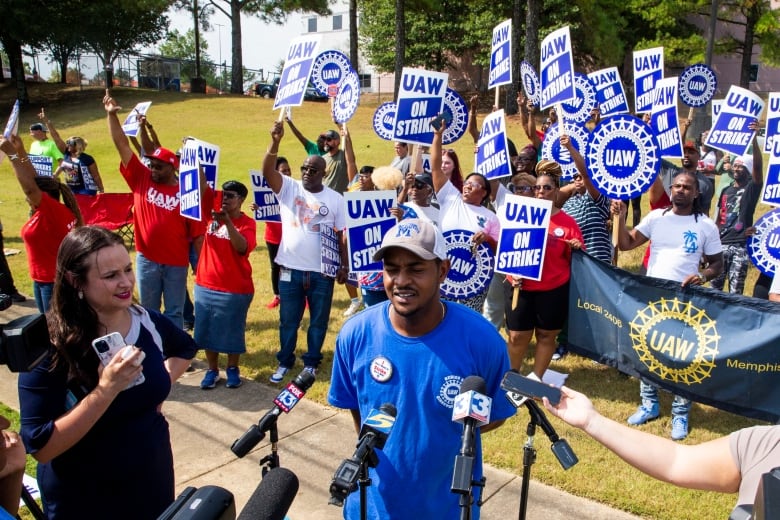Biden set to make ‘unprecedented’ presidential visit to autoworkers’ picket line

U.S. President Joe Biden’s decision to stand alongside United Auto Workers pickets on Tuesday on the 12th day of their strike against major carmakers underscores an allegiance to labour unions that appears to be unparalleled in presidential history.
Experts in presidential and U.S. labour history say they cannot recall an instance when a sitting president has joined an ongoing strike, even during the tenures of the more ardent pro-union presidents such as Franklin Delano Roosevelt and Harry Truman.
The Biden administration has no formal role in the negotiations, and the White House pulled back a decision from the president earlier this month to send two key deputies to Michigan to monitor talks.
Lawmakers often appear at strikes to show solidarity with unions, and during his 2020 Democratic primary campaign, Biden and other presidential hopefuls joined a picket line of hundreds of casino workers in Las Vegas. But sitting presidents, who have to balance the rights of workers with disruptions to the economy, supply chains and other facets of everyday life, have long wanted to stay out of the strike fray — until Biden.
“This is absolutely unprecedented. No president has ever walked a picket line before,” said Erik Loomis, a professor at the University of Rhode Island and an expert on U.S. labour history. Presidents historically “avoided direct participation in strikes. They saw themselves more as mediators. They did not see it as their place to directly intervene in a strike or in labour action.”
Time to pay back workers, Biden says
Biden has previously vocalized support for unionization efforts at Amazon.com facilities and in 2021 passed an executive order that promoted worker organizing.
Biden is also leaning in on his union support at a time when labour enjoys broad support from the public, with 67 per cent of Americans approving of labour unions in an August Gallup poll. But private sector union membership rates have plummeted since the 1980s because of deregulation and anti-union legislation at the federal and state level — just six per cent of U.S. workers belong to a private sector union, compared to 33 per cent of public sector workers.
Supply chain expert and Gravitas Detroit founder Jan Griffiths tells the CBC’s Chris Ensing some automotive suppliers are in a tough position with ongoing strike action in the United States, a tight labour market, and thin cash reserves. Griffiths, who was a global lead at a tier one supplier for decades, said open communication between suppliers could help companies survive.
During the ongoing UAW strike, Biden has argued that the auto companies have not yet gone far enough to satisfy the union, although White House officials have repeatedly declined to say whether the president endorses specific UAW demands such as a 40 per cent hike in wages and full-time pay for a 32-hour work week.
“I think the UAW gave up an incredible amount back when the automobile industry was going under. They gave everything from their pensions on, and they saved the automobile industry,” Biden said Monday from the White House. He said workers should benefit “now that the industry is roaring back.”
Biden and other Democrats are more aggressively touting the president’s pro-labour credentials a day ahead of Republican candidate Donald Trump’s visit to a non-unionized engine parts supplier.
White House officials dismissed the notion that Trump’s visit, announced earlier, forced their hand. They noted that Biden was headed to Michigan at the request of UAW president Shawn Fain, who last week invited the president.
EV transition concerns
The UAW strike, which expanded into 20 states last week, is not without challenges for a Biden administration that has pushed for domestic clean energy jobs, since a part of the workers’ grievances include concerns about a broader transition to electric vehicles. The shift away from gas-powered vehicles has worried some autoworkers because electric versions require fewer people to manufacture and there is no guarantee that factories that produce them will be unionized.
Carolyn Nippa, who was walking the picket line Monday at the GM parts warehouse in Van Buren Township, Mich., was ambivalent about the president’s advocacy for electric vehicles, even as she said Biden was a better president than Trump for workers. She said it was “great that we have a president who wants to support local unions and the working class.”
“I know it’s the future. It’s the future of the car industry,” Nippa said. “I’m hoping it doesn’t affect our jobs.”

Dave Ellis, who stocks parts at the distribution centre, said he’s happy Biden wants to show people he’s behind the middle class. But he said the visit is just about getting more votes.
“I don’t necessarily believe that it’s really about us,” said Ellis.
In Canada, Unifor and General Motors begin contract talks on Tuesday.
Ford Motor Co. of Canada workers represented by Unifor approved a new contract over the weekend. Unifor talks with Stellantis will follow the General Motors of Canada negotiations.




